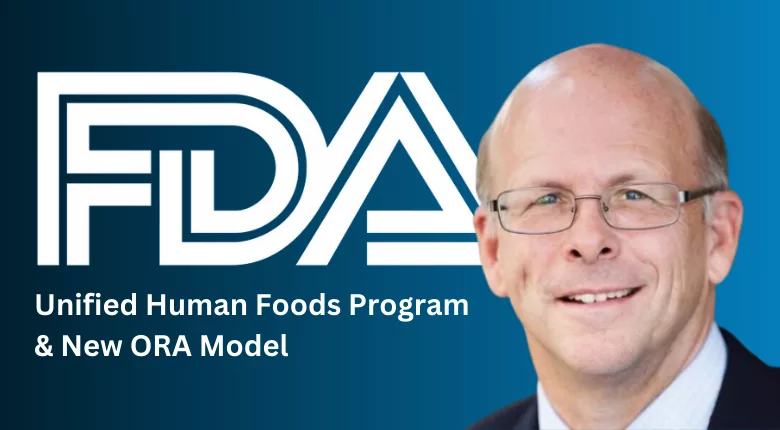FDA Deputy Commissioner Jones Discusses Future of Human Foods Program Under His Leadership

On October 19, 2023, the first Deputy Commissioner for Human Foods at the U.S. Food and Drug Administration (FDA) James (Jim) Jones, who assumed the role in September 2023, released a written statement revealing his priorities for forging a new, unified Human Foods Program (HFP) within the agency. The same day as the written statement was released, Jones held an invite-only media roundtable to elaborate on his written statement. Food Safety Magazine Editorial Director Adrienne Blume was among the editors and journalists in attendance at the roundtable.
Jones revealed his intent to uphold and execute the HFP and Office of Regulatory Affairs (ORA) framework set forth by FDA Commissioner Robert M. Califf, M.D. in January 2023, which was informed by an independent evaluation of the agency’s human foods activities conducted by the Reagan-Udall Foundation throughout 2022. Prior to his appointment as Deputy Commissioner, Jones served on the Independent Expert Panel that conducted the operational evaluation of FDA for the Reagan-Udall Foundation.
Significantly, amid the wave of state legislators aiming to ban possibly harmful food additives, Jones stated his intent to more closely address the issue, beginning with brominated vegetable oil (BVO).
Jim Jones’ Commitments for FDA’s Human Food Program
Deputy Commissioner Jones outlined three priority areas for FDA’s new HFP: preventing foodborne illness, decreasing diet-related chronic disease through improved nutrition, and safeguarding the food supply through the responsible use of chemicals and dietary supplements.
Preventing Foodborne Illness
Jones first highlighted his commitment to expanding FDA’s collaboration with federal partners; state, local, tribal, and territorial (SLTT) regulatory entities; agriculture departments; and international regulatory counterparts to mitigate the risk of food contamination. He stated that FDA will apply knowledge gained from previous foodborne illness outbreaks as the agency works with stakeholders to ensure safety of the U.S. food supply. For example, Jones will make routine visits to FDA’s partners in the field to enhance and improve stakeholder engagement, and to better understand the production of foods regulated by the agency. He also hopes to develop new partnerships that help achieve the goals of the HFP.
Looking for quick answers on food safety topics?
Try Ask FSM, our new smart AI search tool.
Ask FSM →
Additionally, Deputy Commissioner Jones is proposing the establishment of an Office of Critical Foods (OCF) as part of the unified HFP to manage the regulation of infant formula and medical foods. FDA will continue its efforts to incentivize redundancy and resiliency of the infant formula supply chain infrastructure over the long term, and will work with manufacturers to help them take the required steps to manufacture product safely and avoid recalls and plant shutdowns.
Under Jones’ charge, the HFP will also strive to prevent foodborne illnesses by meeting the mandates of the Food Safety Modernization Act (FSMA), and by leveraging scientific and technological advances in alignment with the agency’s New Era of Smarter Food Safety blueprint.
Safeguarding the Food Supply Through the Safe Use of Chemicals and Dietary Supplements
FDA also aims to keep food safety its first priority, especially for vulnerable populations like children, while supporting innovation in food ingredients and food packaging, advances in safety testing and assessment methodologies, and new information sources on food composition and consumption. As a former U.S. Environmental Protection Agency (EPA) pesticide and chemical regulator, Jones brings a wealth of experience and background in chemical safety, which he hopes to leverage to advance the prevention and reduction of people’s exposure to contaminants and other harmful chemicals through foods.
As an example of this work, FDA is designing a proposed rule to amend its regulations to remove the authorization of BVO as a food ingredient in light of a recently published study that raises potential safety concerns. FDA will also continue its efforts to reduce babies’ and young children’s oral exposure to environmental contaminants through the Closer to Zero initiative.
Deputy Commissioner Jones will lead the teams comprising the HFP’s Office of Food Chemical Safety, Dietary Supplements, and Innovation. He hopes to employ the scientific expertise that applies to safety evaluations of both foods and dietary supplements and to facilitate the safe use of innovative ingredients.
Decreasing Diet-Related Chronic Disease Through Improved Nutrition
Finally, Jones intends to with his team to utilize tools at the agency’s disposal to help the U.S. live healthier lifestyles through improved nutrition. One of the HFP’s goals is to ensure that people across the country have greater access to healthier foods and nutrition information. FDA’s nutrition priorities include reducing sodium across the food supply, updating and making labels more accessible to help consumers make healthy choices, promoting healthy habits early, and supporting innovation.
To elevate and strengthen the agency’s nutrition portfolio, the proposed HFP includes creating a Nutrition Center of Excellence, which will enable FDA to strategically focus on nutrition policies and initiatives.
An example of ongoing work the agency is conducting in the area of nutrition is research to explore the development of a standardized, science-based, front-of-package labeling scheme to help consumers—especially those with less complete knowledge of nutrition—quickly and easily identify foods that are part of a healthy eating pattern. In October, FDA will host a public meeting with the Reagan-Udall Foundation to hear input from stakeholders on front-of-package labeling, as well as a virtual public meeting and listening sessions on strategies to reduce added sugars consumption in the U.S. As part of its strategic vision of increasing engagement with stakeholders in the nutrition space, FDA is launching a series of Tribal Listening Sessions to begin a conversation with federally recognized tribes on food sovereignty, food equity, and other issues that impact nutrition.
October 19 Media Roundtable with Deputy Commissioner Jones
In the October 19 invite-only media roundtable with Deputy Commissioner Jones and FDA staff, Jones elaborated on the written statement he issued that day. He discussed his role amid the "significant reorganization at FDA" and emphasized that his position would focus on preventing foodborne illness. He also said that FDA had taken a considerable portion of the Reagan-Udall report's recommended advice.
Amid its reorganization, FDA is focused on minimizing duplication of efforts and strengthening its relationships and interactions with stakeholders. "Our stakeholders are important for FDA to succeed," Deputy Commissioner Jones said, explaining that FDA will work more closely with them to understand how they operate, learn about their restrictions and management, and learn from them to facilitate the crafting of FDA guidance and regulation. FDA is also focused on expanding its collaborations with state partners. On the nutrition side, FDA will be focusing its efforts on nutrition improvement for the betterment of public health, as well as food product labeling efforts to help consumers make fast, healthy decisions. "We want to show our work, so that the public can see it and give their feedback," Deputy Commissioner Jones said.
Members of the media were given the opportunity to ask questions during the roundtable. Food Safety Magazine Editorial Director Adrienne Blume addressed the issue of BVO, which Deputy Commissioner Jones mentioned in his written statement. She asked, "You mentioned FDA's proposed rule to remove the authorization for the use of BVO as a food ingredient because of safety concerns. BVO is also one of the banned food additives in the recently passed California Food Safety Act, and in a similar New York Senate bill. Does this proliferation of state regulations undermine the FDA's authority to set these types of regulations at a federal level?"
Deputy Commissioner Jones explained that the states do not preempt federal law, but that they do have the ability to make their own standards and regulations. "Ideally, when the federal government is more active in the regulatory process, then the states don't feel as much need to act," he said, adding that FDA would be addressing the issue of food additives more closely under his leadership.
Blume also had the opportunity to ask the Deputy Commissioner the following question: "With the greater authorities given to FDA under FSMA and the growth of whole-genome sequencing, some food processors are nervous that the technology will effectively be used against them in the pursuit of a prevention-based food safety strategy. Can you say anything to ease their minds about that?"
Deputy Commissioner Jones explained that as whole-genome sequencing and other technologies are further applied, the goal is to make things easier and less problematic or worrisome for processors, since it will allow for a more streamlined process for discovering and addressing issues. The point of this type of technology, Jones said, is to enable better science to make things less disruptive by allowing regulators to go straight to where the problem is instead of shutting down an entire industry out of caution; however, he does understand processors' concerns.
Another media member asked a question that was also on Blume's radar, regarding the culture issues at FDA identified by the Reagan-Udall report and Commissioner Jones' ideas on effecting a needed cultural transition at FDA. Jones explained, "When there's not a lot of clarity as to where the decisions get made, it leaves staff at a loss as to how to resolve issues." This also requires considerable consensus among people for things to happen and decisions to be made, he explained. "Some of the issues of indecisiveness that were happening were the result of the structure at the top that permeated down," Jones said. "We're changing the structure so that there's not that lack of clarity anymore."
Jones also explained how, although he will report directly to FDA Commissioner Califf and will serve as the final arbiter of decisions for the Human Foods program, this does not mean that he will be making all of the decisions. Instead, key FDA staff will also be empowered to make decisions because there will be more clarity, which will come from staff members better understanding the framework of the organization.
Food Safety Magazine thanks FDA and Deputy Commissioner Jones for the opportunity to join the October 19 roundtable and hear more about his commitment to fulfilling the vision of the Agency's proposed Human Foods Program. Jones will share further details about the actions he will be taking as Deputy Commissioner for Human Foods to realize FDA’s vision for the HFP transformation in the coming months.










